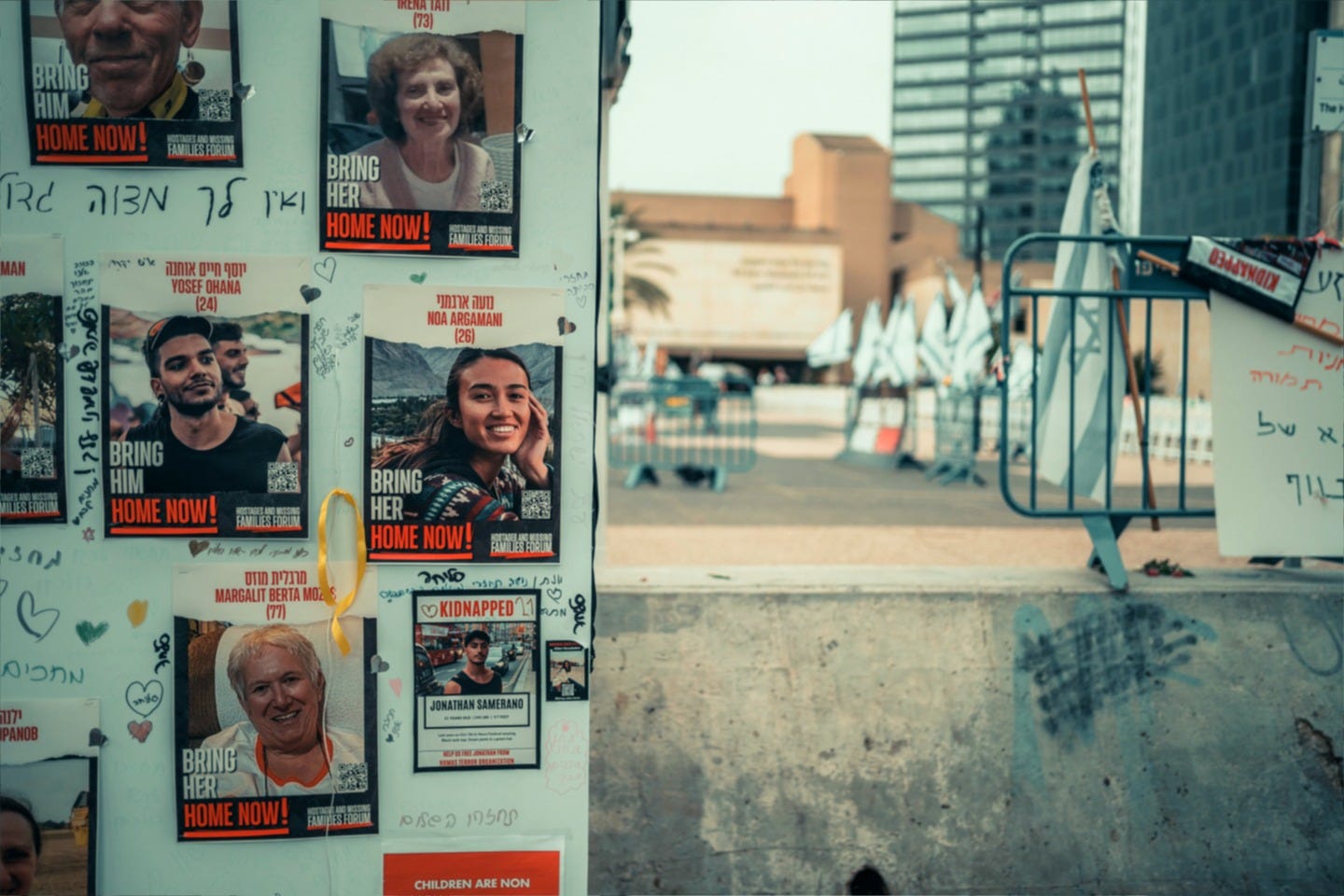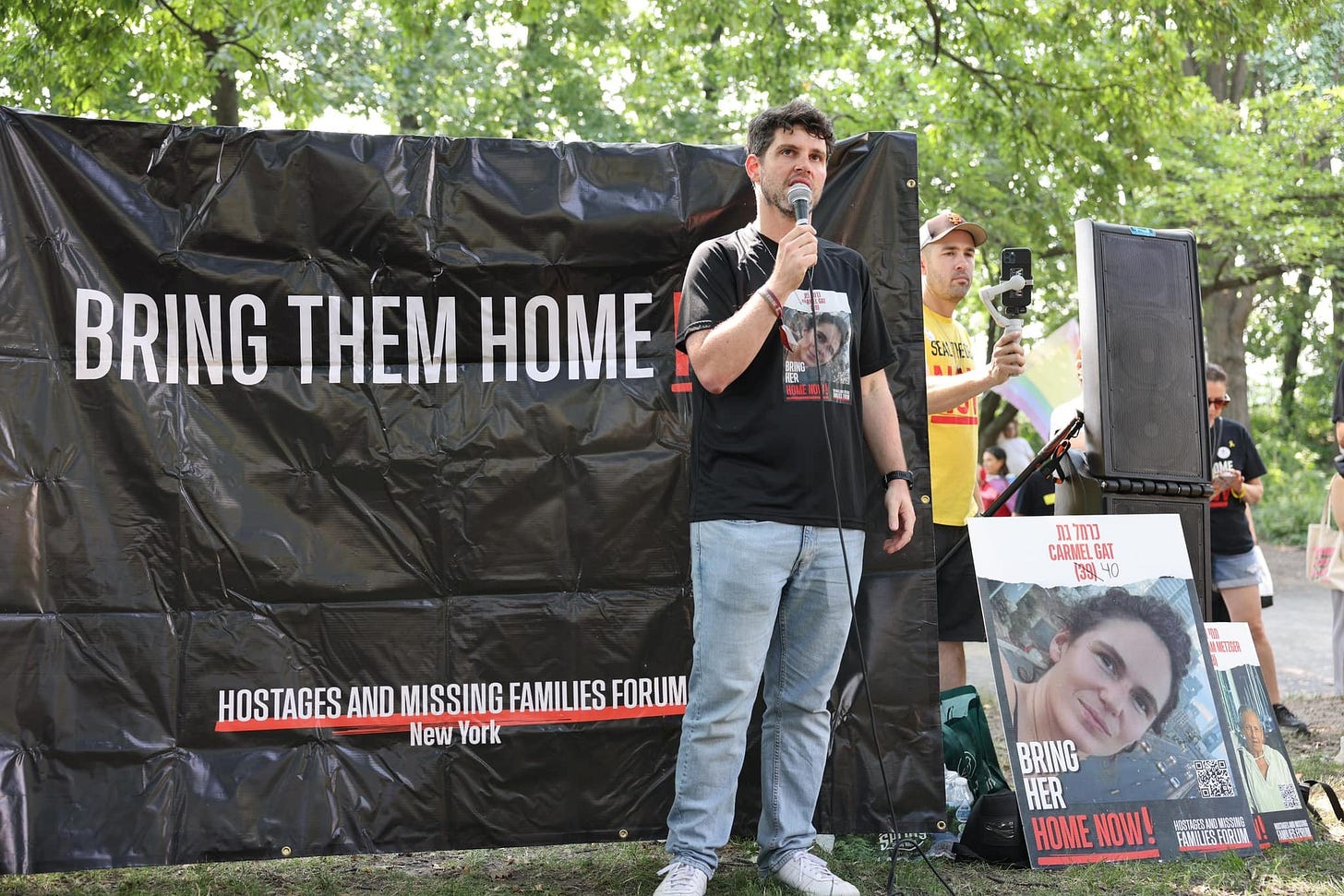There is no right or wrong opinion about the Israeli hostages.
From idealism to realism, there are a multitude of viewpoints about the Israeli hostages, and all of them are equally valid.

Please consider supporting our mission to help everyone better understand and become smarter about the Jewish world. A gift of any amount helps keep our platform free of advertising and accessible to all.
You can also listen to the podcast version of this essay on Apple Podcasts, YouTube Music, YouTube, and Spotify.
Six Israeli hostages were executed by Hamas just a few days ago.
They lived for nearly 330 days in captivity of Hamas gangsters, kidnappers, incinerators, and rapists led by Islamist, antisemitic, and genocidal convictions.
The hostages were reportedly murdered mere days before IDF soldiers had the chance to rescue them. I happen to believe that Hamas purposely executed and left them to be easily found by the IDF as a repugnant form of psychological warfare designed to increase Israeli society’s pressure on our government to agree to a Hamas-friendly hostages-for-ceasefire deal.
But that is exactly my point. When it comes to discussions about the Israeli hostages and how the State of Israel should approach this ordeal, it is simply a matter of interpretation.
We can quickly understand the families and friends of the hostages who are eager to do everything possible for their loved ones to return. As Rachel Goldberg-Pollin, the mother of one of these six recently murdered hostages, said:
“The price of bringing these people home will be high, but the price of not bringing them home will be higher, because we will never recover as a people ... and then we will really lose because we will not be able to recognize ourselves. We will look in the mirror and see a stranger winking back at us.”
I have no doubt that I would think and feel the same if presented with her plight, as well as those of the other family members and friends of the remaining hostages.
Then there are the idealists who believe that the State of Israel should have never let October 7th happen, or at least to the degree that it did. According to their calculus, the Israeli government is chiefly responsible for securing the abductees’ return above everything else, no matter how unfavorable a ceasefire-for-hostages deal might be for Israel.
Yes, these idealists argue, Hamas ultimately took these hostages and killed them — and there should be no expectations otherwise. Hamas is a terrorist organization whose pristine purpose is Jewish misery and murder. Its leadership is comprised of a bunch of brutal, Islam-obsessed thugs.
Yet the Israeli government failed not because there was no deal to secure the hostages’ return — this could be because of Hamas alone — but because the majority of Israeli society is convinced that our government is not making enough of an effort to return the abductees.
“Not everything depends on Israel, but the expectation, the hope, and the demand is that we will do everything possible to bring back those who were cut off from us,” according to Nadav Eyal, one of Israel’s leading columnists.1
Eyal went on to suggest that the Israeli government’s subpar efforts in paving the way for a ceasefire-for-hostages deal is destroying the value of Israeliness “on an industrial scale,” adding: “Without agreement on a mutual guarantee (that Israeli citizens trust the state to protect them and that the state does indeed do so), without this inner feeling, Israel is emptied of its soul.”
This same arithmetic can be applied to every democratic country involved in this Israel-Hamas-Hezbollah war, including the United States. Ohad Merlin, a Middle East affairs correspondent for The Jerusalem Post, argued:
“One of the most striking issues is the United States’ persistent ingratiation with Qatar. Doha is one of the main funders of Hamas’ extensive tunnel system, a key element to hide hostages and smuggle weapons; it is also a main instigator of feuds within the United States. Today, almost 11 months since October 7th, Qatar has failed to stand up to its duty and recognize its responsibility for the massacre and the hostages, essentially blaming Israel and the U.S. for trusting the royal Al-Thani family regime in the first place.”2
More than 20 U.S. citizens were kidnapped by Hamas on October 7th while the leaders of Hamas resided in Doha’s luxurious residencies. The Qatari Emir and his father sat in the front row at Hamas leader Ismail Haniyeh’s funeral in Doha a few weeks ago while abductee Hersh Goldberg-Polin and seven other U.S. nationals were subject to agony and torture under Haniyeh’s subordinates.
“Seeing as the U.S. opted not to send boots on the ground to fight Hamas and release its nationals held in captivity, nor to pressure the terrorist’s sponsors in any way, the question remains whether the United States of America even remembers its part in the social contract,” wrote Merlin.
So far, the U.S. has failed to hold Hamas’ custodians accountable. There were no sanctions against Doha, the U.S. lease of its massive military base in Qatar was renewed, and President Joe Biden’s administration “keeps treating Doha, which provides safe asylum to the leaders of those who kidnapped its own citizens, as a precious ally instead of pointing to it as the terror greenhouse it is,” as Merlin put it.
This brings us to the realists, whose argument is simple yet unfortunate: The world has always been a deeply corrupt and harsh place, and we must accept realities as they are, not as we wish them to be.
One of these realities is that U.S. President Joe Biden’s Democrats have been in bed with the Qataris since the 1990s, when then-U.S. President and fellow Democrat Bill Clinton decided to build the Middle East’s largest American military base in Qatar, with the Qataris agreeing to invest $1 billion in the construction.
And it was the next Democratic Party president, Barack Obama, who facilitated Qatar’s rise to prominence. Both Obama and his foreign affairs chief, Hillary Clinton, shifted the priorities in America’s Middle East policy, disassociating themselves from their traditional ally in Saudi Arabia for a new anchor in this region. They stayed their choice on Qatar.
Why?
Well, foreign actors have given millions of dollars to U.S. presidents. But disclosure of these contributions — some of which were made while the presidents were still in office — only came after the fact.

For example, Bill Clinton’s library and museum provided a list of its top 150 donors to congressional investigators during the Rich scandal in early 2001. The identities of other donors — including the governments of Saudi Arabia, Dubai, Kuwait, and Qatar — emerged in media reports only after the Clintons left the White House.
Hence why Hillary Clinton did not challenge Obama on ISIS and Hamas’ funding source in Qatar. To add insult to injury, The Clinton Foundation also accepted a $1 million gift from the Qataris while Hillary Clinton was serving as the U.S. Secretary of State, without informing the State Department.3
During Obama’s presidency, he coddled and courted Qatar, the funder of ISIS and Hamas, modern nihilistic death cults dedicated to the killing of Christians, Gays, and Jews. After all, Obama was a very young second-term president. He was not wealthy and “needed a job” for the next 30 to 40 years following his presidential tenure, similar to former Democratic U.S. President Jimmy Carter. Although he denies its scope and bias, Carter has been profusely funded by Arab countries. You will also recall the Carter was the one who pushed for Hamas’ inclusion in the Gaza elections.
Back in Israel, the realities are not any less bleak. Many have reason to believe that Israeli Prime Minister Benjamin Netanyahu is torpedoing a ceasefire-for-hostages deal not because it would be bad for Israel, but because it would endanger his governing coalition and lead to early parliamentary elections, which some polls indicate his Likud party would lose.
Let’s recall the four continuities in war, according to John Spencer — an urban warfare expert who served for more than 25 years in the U.S. military — number one being: “War is political.”4
Louis Libin, an expert in military strategies and innovation, is of the opinion that:
“… you cannot blame Prime Minister Benjamin Netanyahu for the deaths of the hostages. However, you can blame him and others in the security establishment for not heeding the warnings of a possible Hamas attack prior to October 7th. The Israeli government had a responsibility to protect its citizens and failure to act on intelligence warnings is a dereliction of that duty.”
“Something will have to be done to make sure that those who failed us are properly dealt with, but not now that we are in battle on so many fronts. Blaming the government or focusing on the prime minister at this moment may feel good but the consequences to the country could be devastating.”5
There is also the viable argument that rescuing the remaining hostages as part of a deal with Hamas would ensure the terrorist organization remains in governing and military power of Gaza, which in turn would put more Israelis at risk of being kidnapped in the future.
Hence why the Tikva Forum of hostage families called on Netanyahu to end months-long negotiations aimed at achieving an elusive ceasefire-for-hostages deal with Hamas. The group, an alternative to the larger Hostages and Missing Families Forum, is opposed to the idea of a deal at any cost, and believes that only military pressure will lead to their loved ones’ release.
What’s more, some Israelis are concerned that releasing hundreds or even thousands of Palestinian prisoners as part of a ceasefire-for-hostages deal would repeat the same mistake made in 2011, when Israel and Hamas signed an agreement to release kidnapped Israeli soldier Gilad Shalit in exchange for 1,027 mostly Palestinian prisoners.
This included Yahya Sinwar, Hamas’ current leader who took part in the kidnapping of two Israeli soldiers in 1989 and was sentenced in Israel to life in prison. Netanyahu was Israel’s prime minister back in 2011 and surely does not want to make this same mistake again.

In recent weeks, many reports have focused on the Israeli internal debate about the Philadelphi Corridor on the border between Gaza and Egypt, and whether Israel holding on to it is essential to prevent Hamas from rebuilding its power in Gaza.
Hamas has controlled this border since 2007 and used it to build up an unprecedented arsenal that allowed the terror group to carry out the largest massacre of Jews since the Holocaust. It stands to reason that the control of the border was a key ingredient in Hamas’ strength, which is why the terrorist organization wants it back as part of a ceasefire-for-hostages deal.
On Monday, Netanyahu argued forcefully for what he said was the “strategic imperative” to keep Israeli troops stationed along the Philadelphi Corridor, insisting that the 14-kilometer (8.7-mile) border is essential for Israel to achieve its war aims and that retaining control there is “central” and determines Israel’s very future.
Netanyahu claimed that if the IDF withdraws even for the 42-day first phase of a ceasefire-for-hostages deal, it would never be able to return, and thus Hamas would be able to rearm, revive, and carry out more massacres and kidnappings.
Despite massive pressure to withdraw from the Philadelphi Corridor and end the war, such a withdrawal would “not bring back the hostages” but would have the “opposite” effect, Netanyahu argued, also claiming that leaving the Philadelphi Corridor could enable Hamas to spirit the hostages overground across the border into Egypt and from there to Iran or Yemen during that 42-day first phase.
In 1986, Netanyahu edited a book based on a 1984 conference convened in Washington by the Jonathan Institute (named after his late brother, Yonatan Netanyahu, the hero of Israel’s hostage rescue operation in Entebbe in 1976).
The book is titled, “Terrorism: How the West Can Win” — comprising a range of fascinating articles written by Netanyahu himself (who was then Israel’s permanent representative to the United Nations), as well as his father (historian and professor Benzion Netanyahu), former American diplomats George P. Shultz and Daniel Patrick Moynihan, former Israeli Prime Minister Yitzhak Rabin, and former Israeli Foreign Minister Moshe Arens (Netanyahu’s political mentor).
Netanyahu wrote in the preface that the West must brace itself for the battle against international terrorism, of which it is the principal target, and adopt a variety of means — political, economic, and militaristic — with which to fight it, adding:
“But underlying them all must be the moral understanding that terrorism, under whatever guide or pretext, is an inexcusable evil, that it obliterates the political and moral distinctions which are the foundations of humane and free life under the rule of law; that the West, in short, must resist terrorism and ultimately defeat it.”
Netanyahu was also spot-on particularly when referring to hostage-taking, calling it the classic terrorist act which places a government in a terrible dilemma. He wrote: “If it uses force to release the hostages, it might end up with more people killed than if it gives in. If it yields, the terrorists emerge victorious.”
Then Netanyahu offered this advice: “The terrorists must believe that the authorities are prepared to take forceful action whether or not the hostages have been killed. The mere act of taking hostages warrants such a policy. It is a fundamental error to let the terrorists believe there are instances when they are completely safe from military action. The more terrorists believe that such action is likely, the less prone they will be to continue their siege.”
“השמדת ערך לישראליות.” Ynet News.
“US continued failure to curb Qatar over nationals in Hamas captivity - comment.” The Jerusalem Post.
“Fact Check: Did the Clinton Foundation accept unauthorized money from Qatar?” The Florida Times-Union.
John Spencer on X
“The devastating psychology of taking hostages - opinion.” The Jerusalem Post.



I think in retrospect Israel should have never negotiated with terrorists for hostages in the first place. I know it sounds callous, but they know Israel will do anything to get hostages back which gives hostages great value to them.
As much as I have mercy on them, I don’t agree with the hostage families who want capitulation. We know the names of their loved ones. But we know that for each of them, others will die and be kidnapped if Israel gives in to Hamas demands.